This bird, the Polish Chicken, originally comes from the Netherlands. Today, there are several stories about how the birds came to be in Europe. However, many people love the story that claims that around 1736, the Polish king at that time was unseated from his royal throne.
He had to flee to France. He loved his Polish chickens so much that he took them with him and very soon the French society loved them, especially those from French aristocracy circles. That assured their future. For many, this story is far from the truth.
For others, the real truth is that the birds were probably imported into the Netherlands from Spain. Some also claim the chickens got their name ‘Polish’ because of the word ‘Pol’ which means large-headed.
Already dating as far back as the 15th century are paintings depicting the Polish Chicken. In the 16th century, the Polish Chicken was announced to be a thoroughbred breed by the Dutch people. By the 1700s the Polish Chicken was found in England.
Polish Chicken | Breed Profile
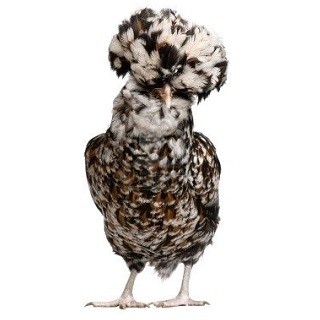
| Country of origin: | Netherlands |
| Primary use: | Ornamental |
| Weight: | Male: Standard: 2.75 kg, Bantam: 850 g; Female: Standard: 2 kg, Bantam: 740 g |
| Temperament: | Friendly |
| Recognized Varieties: | Buff Laced, White, White Crested, Silver, Black, Black Crested, Golden |
| Egg production (annual): | 200 |
| Egg color: | White |
| Egg size: | Medium |
| Comb type: | Duplex |
Characteristics Of The Polish Chicken
You are not likely to mistake the Polish chicken, with its unique and often comical looking pom-pom hairdo. These head feathers of both hen and cock grow, cascading over and around their heads and faces, sometimes causing them difficulty with their vision.
The Polish Chicken is a beautiful bird, and that is why it is bred, mainly, because of its showy looks. This bird does not go broody often. Polish Chicken eggs are white and small in size.
These birds can be a target for predators because their vision is not all that great. Chicken keepers of this chicken breeds need to give the bird extra care and attention to keep them safe.
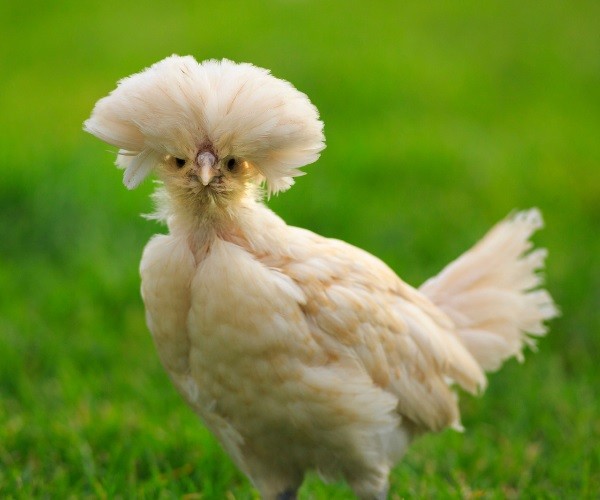
There are a few varieties of the Polish Chicken. The bearded variety is the White Crested Black and the Black Crested White. The non-bearded variety is known as the Golden, Silver, Buff Laced and White.
There is also the Polish Frizzle chicken variety. The Polish Chicken has a prominent crest. Its comb is V-shaped with large nostrils that you see in crested chicken breeds.
Legs are grey and are not feathered. Cocks weigh in at 6 pounds with the hen weighing in at around 4-½ pounds. Their skin is white.
Related Topic – 69 DIY Chicken Coop Plans and Ideas – Easy to Build (100% Free)
Behavior / Temperament
They are lovely, friendly, and quiet chickens. With more aggressive breeds around them, they can be bullied on because of their docile temperament. It is thought that the Polish Chicken bird can become flighty and nervous but this is more because of the hair over its eyes, preventing it from seeing correctly.
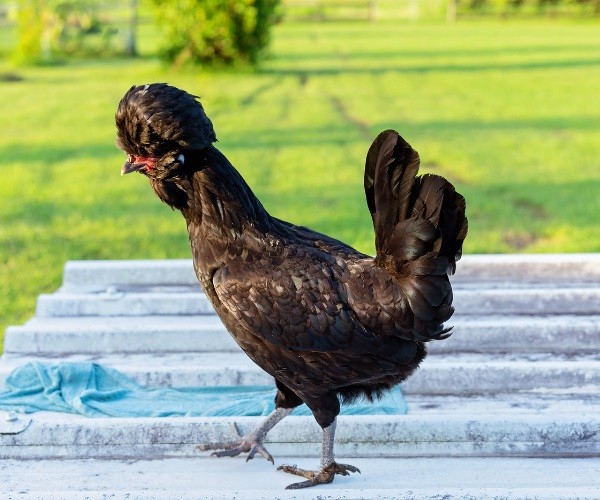
Pros and cons of the Polish Chicken …
Pros
- Docile, quiet and friendly.
- Good foragers.
- Beautiful.
- Doesn’t mind confinement.
Cons
- Not suitable for cold and wet conditions.
- They are picked on by other aggressive breeds because of their excellent nature.
- Vision ‘problems’ caused by feathers over their faces.
Related Topic – 15 Most Common Chicken Diseases, Symptoms and Treatment
Is The Polish Chicken The Right Choice For You?
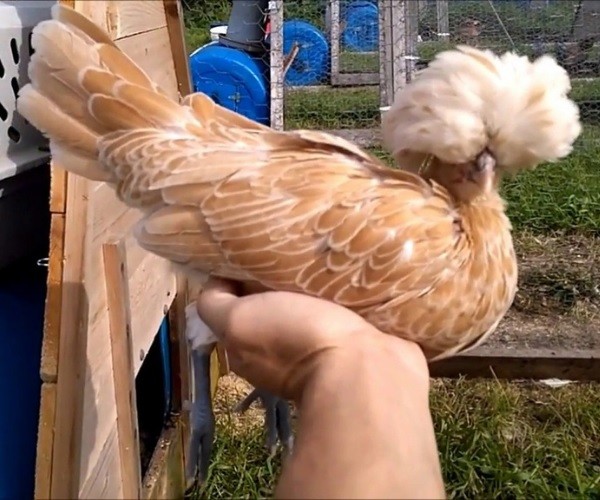
- The Polish Chicken is generally bought to show off the bird at shows. That means those who buy them for that purpose need to do their homework and make sure that their birds meet the Standard of Perfection requirements. Much work has to go into meeting requirements for showing birds.
- If you intend to buy a bird for your backyard garden, the Polish Chicken is an easy chicken to have in the garden; they are docile, not noisy. People like the thought of a chicken that looks a bit different to the other standard looking type breeds. You smile when you see a Polish chicken.
- Polish Chickens can handle confinement well. It has an inquisitive nature, but because of its eyesight held back by the mop of feathers that cover its head, it needs protection from predators. It does not tolerate the cold and wet very well.
- If you have other more aggressive breeds of chickens in your garden, you need to look out for your Polish Chickens because they will get pecked on by other birds, even pulling them by their head feathers. That is because they are so good-natured and docile. The head feathers too can become prone to lice and mite infestations, so it is essential to check the chickens out regularly to prevent the infestation from becoming troublesome.
- The Polish Chicken used to be a good egg layer, but these days they are not known so well for their egg-laying abilities, maybe producing around 200 eggs in a year. They take a bit of time to get into laying, but once getting into it, they can be pretty consistent.
- It is a good idea to trim the feathers on the face of the Polish Chicken for its well-being, so it can see when predators are on the prowl. Eye infections can also occur if the feathers are always in their eyes. It is because of these vision problems that they can often get separated from others; they cry out for the other hens.
- All in all, this unusual chicken is a pleasure to own, and worthy of a place in the flock because they are so lovely to look at. Polish chickens for sale are becoming a rarity, and it would be a great pity to let this bird, which graced the French aristocracy gardens disappear off the chicken lists, it certainly doesn’t deserve that!
Ultimate Guide To Take Care For Polish Chicken
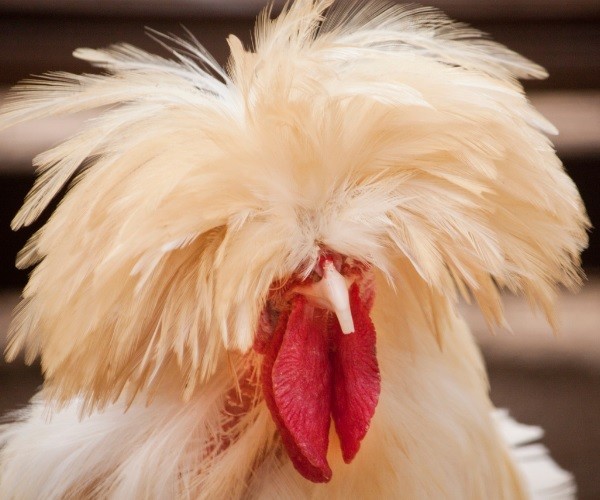
1. Keep them healthy
The first and most important thing you can do to keep your Polish chickens healthy is to provide them with a clean, dry and warm shelter. In addition, their coop should have plenty of ventilation to prevent dampness and an area where they can perch off the ground.
It’s also important to give them access to fresh water and food. A balanced diet is essential for keeping chickens healthy, so ensure their feed contains all the necessary nutrients.
2. Handle with care
Polish chickens are particularly docile, but it’s still important to handle them with care. Avoid picking them up by their wings or legs, as this can cause injuries. Instead, cup them gently in your hands or use a chicken-handling glove.
3. Keep them clean
Chickens can be susceptible to diseases, so keeping their living area clean is important. This means regularly cleaning out their coop and providing them with fresh bedding. You should also disinfect their feeders and water containers regularly.
4. Vaccinate them
Vaccinating your chickens is one of the best ways to protect them from disease. Vaccinations are available for common chicken diseases such as Marek’s disease, Newcastle disease and avian influenza. Speak to your veterinarian about which vaccinations are appropriate for your chickens.
5. Watch for signs of illness
Even if you take all the necessary precautions, chickens can still succumb to illness. Watch for signs of illness such as lethargy, reduced appetite, diarrhea or increased respiratory rates. If you notice any of these symptoms, immediately take your chicken to the vet.
By following these simple tips, you can help keep your Polish chickens healthy and happy.
FAQ: Polish Chicken
Can you eat Polish chicken?
Yes, you can eat Polish chicken. There are no special dietary restrictions for eating Polish chicken.
Are Polish chickens good?
Yes, Polish chickens are considered to be of good quality. They are often used in breeding programs and are known for their high egg production.
What do Polish chickens taste like?
Polish chickens generally have a milder flavor than other chicken breeds. Some people say they have a hint of lemon or rosemary in their flavor.
Can you trim polish chicken feathers?
Yes, you can trim polish chicken feathers. However, it is not necessary to do so and the feathers can be left on if desired.
Do all Polish chickens have combs?
No, not all Polish chickens have combs. Some chicken breeds are naturally combless, such as the Araucana. However, most Polish chickens will have combs.
Are Polish chickens friendly?
Yes, Polish chickens are generally considered to be friendly and docile. They make good pets and are often used in therapy programs.
Conclusion of Polish Chicken
Polish chickens are a good choice for those looking for a mild-flavored chicken. They are also considered friendly and docile, making them good pets. However, not all Polish chickens have combs, so check before you purchase one. Overall, Polish chickens are good for those looking for quality chicken.
Last Updated on January 14, 2025 by Pauline G. Carter

